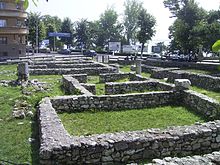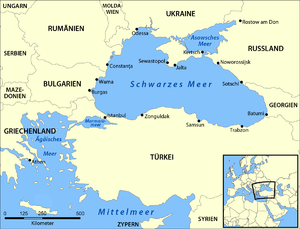Tomoi
Tomoi ( ancient Greek Τόμοι ), also Tomis ( Τόμις ), is the ancient name of a place in Moesia , located in the urban area of today's large city Constanța in Romania, located on the Black Sea coast, about 50 kilometers south of the (ancient) mouth of the Danube near Histria . The place was an Ionian colony that existed in 633 BC. Was founded from Miletus .
The myth of the origin of the city of Tomoi
The ancient Greek word τόμοι tomoi means "division" or "cut". The Greek mythology after Tomoi was the Greek King Aeetes of Colchis (on the east coast of the Black Sea, the river Rioni ), the father of Medea , was founded. After Jason had stolen the Golden Fleece from Colchis with the help of Medea , the Argonauts fled together with Medea and her brother Absyrtos across the Black Sea towards Greece. King Aietas pursued the Argonauts' ship and got closer and closer to it. To stop her father Aietas, Medea killed her brother Absyrtus according to the library of Apollodorus (book 1, chap. 9,24,1), cut his body into small pieces and threw them into the sea. Aietes had to break off his pursuit, collected the pieces of the corpse, turned back and buried his son in a place he called Tomoi.
“Tomoi is a foundation of Miletus. It is inhabited all around by Scythians. "
history
In archaic times the city was in Thracian territory, was surrounded by Scythians and Celtic tribes and temporarily conquered.
In classical times there were disputes between Byzantium and Kallatis over ownership of the city. Since about 255 BC Tomis was independent, since the campaign of Lucullus in 72 BC. BC Roman. The Dacer king Burebista conquered the city between 60 and 48 BC. Around 29 BC It was conquered again by the Roman general Marcus Licinius Crassus for the Romans. The city was a member of the Union of Cities of the Pontic Pentapolis .
The poet Ovid was exiled to the place by Emperor Augustus in 8 AD and died here. Under the Roman Emperor Constantine I , the city was renamed Constantiana in honor of his sister and became an important metropolis.
Evidence of the city's history
The agora of the Greek city founding was in the area of today's Piața Ovidiu with the monument of Ovid. Numerous archaeological finds were made in the vicinity during construction work, for example the mosaic floors uncovered at the Archaeological Museum Constanza .
See also
Web links
Coordinates: 44 ° 10 ′ 22.4 " N , 28 ° 39 ′ 30.5" E


